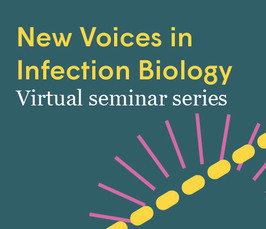Choanoflagellates and the origin of animal innate immunity | New Voices in Infection Biology
- Datum: 24.03.2021
- Uhrzeit: 16:00
- Vortragende(r): Arielle Woznica
- University of Texas Southwest Medical Center
- Ort: Zoom video conference
- Gastgeber: Marcus Taylor
- Kontakt: vseminars@mpiib-berlin.mpg.de

If you are interested in joining the seminar, please contact: vseminars@mpiib-berlin.mpg.de
Once registered, you will receive a zoom conference link 30 mins before the talk starts - please sign in using your full name.
Talk abstract:
While all animals must sense and respond to pathogens, little is understood about how animal innate immunity first evolved. As the closest living relatives of animals, choanoflagellates can provide unique insights into mechanisms of immunity that preceded animal origins. Here, we identify the first known choanoflagellate pathogen, and develop transgenic and genetic tools in Monosiga brevicollis to establish it as a choanoflagellate model for the study of innate immunity.
To identify a pathogen of M. brevicollis, we screened diverse bacteria and found that Pseudomonas aeruginosa elicits pathogen avoidance behavior, and induces cell death after sustained exposure. Next, we leveraged this interaction to identify candidate choanoflagellate immune genes, and were surprised to find that the M. brevicollis homolog of STING, a key facilitator of cytosolic DNA-induced innate immune signaling in animals, is upregulated in response to P. aeruginosa. Because phylogenetic alignments of choanoflagellate and animal STING proteins indicated that key cyclic dinucleotide (CDN) binding residues are conserved in M. brevicollis STING, we sought to determine whether M. brevicollis responds to CDNs. We found that the CDN 2’3’cGAMP induces autophagy and the transcription of putative immune genes in a STING-dependent manner. Finally, comparing immune responses in wildtype and STING deficient M. brevicollis has allowed us to uncover other components of the STING signaling, providing further insights into the role of STING in pre-animal immunity.